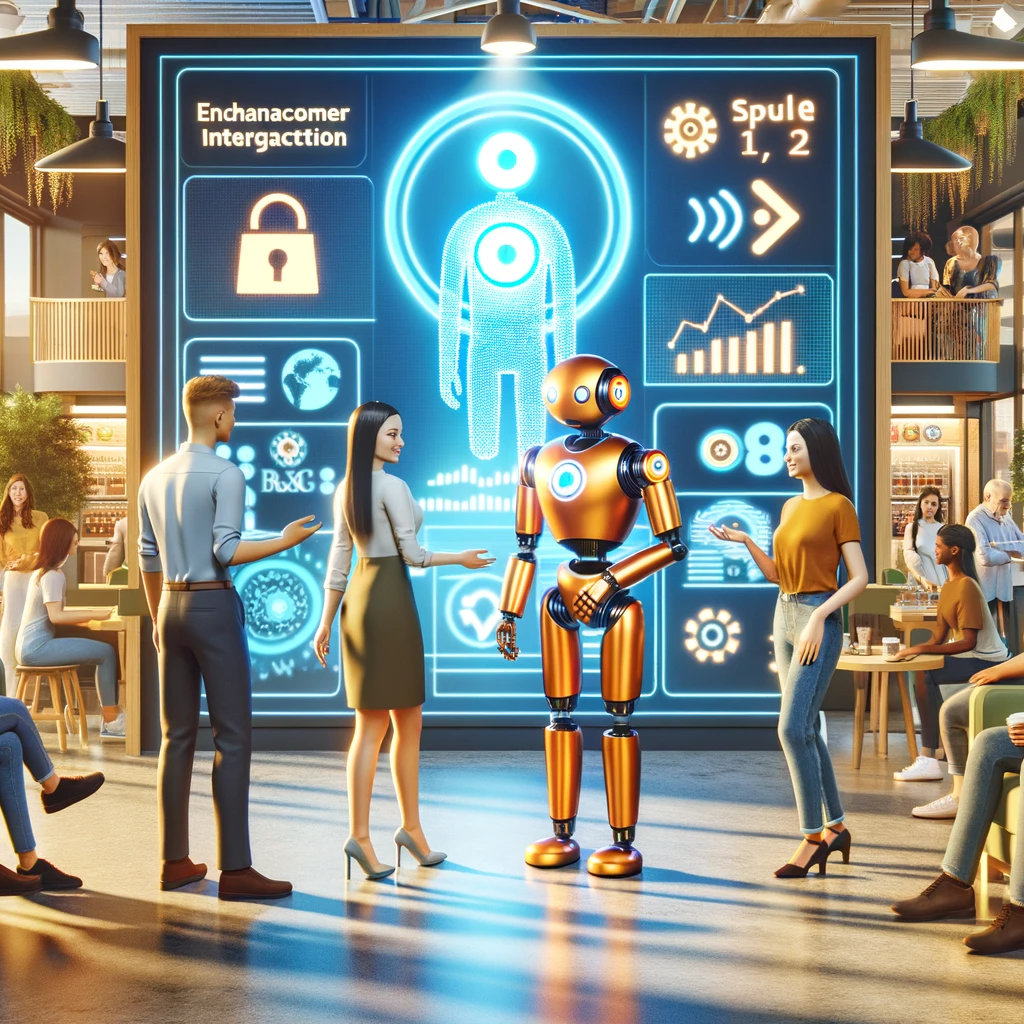Introduction
In today’s rapidly evolving digital landscape, businesses are constantly seeking innovative ways to engage with their customers. One such innovation that has been gaining significant momentum is the use of AI bots in marketing. These intelligent bots are revolutionizing the way companies interact with their audience, providing personalized experiences, and driving higher levels of engagement. In this blog, we will explore the role of AI bots in marketing and how they are enhancing customer interaction and engagement.

The Rise of AI Bots in Marketing
Artificial Intelligence (AI) has made remarkable strides in recent years, and it’s no surprise that businesses are harnessing its power to improve their marketing strategies. AI bots, also known as chatbots or virtual assistants, have become indispensable tools for companies looking to automate customer interactions. These bots are powered by sophisticated algorithms and Natural Language Processing (NLP) capabilities, allowing them to understand and respond to customer queries in real-time.
One of the key reasons behind the rise of AI bots in marketing is their ability to provide instant support and assistance. Whether it’s answering frequently asked questions, helping with product recommendations, or guiding users through a website, AI bots are available 24/7, ensuring that customers receive timely responses. This not only enhances the customer experience but also frees up human resources for more complex tasks.
Personalized Customer Experiences
One of the most significant advantages of AI bots in marketing is their ability to deliver personalized experiences. These bots can analyze user data and behavior to tailor their interactions accordingly. For example, if a customer frequently browses products related to fitness, an AI bot can proactively recommend fitness equipment or workout plans during a chat session.
Moreover, AI bots can remember past interactions with customers, allowing for a seamless and personalized conversation. This level of personalization goes a long way in building customer loyalty and trust. Customers appreciate when a brand understands their preferences and needs, and AI bots excel in this aspect.
Driving Engagement through Proactive Outreach
Traditionally, customer interactions in marketing were primarily initiated by the customer. However, AI bots have flipped the script by enabling proactive outreach. These bots can reach out to customers with relevant information, promotions, or updates, keeping them engaged even when they are not actively seeking assistance.
For instance, an e-commerce company can use AI bots to send personalized product recommendations via email or chat messages based on a customer’s browsing history. This not only reminds customers of the brand’s presence but also entices them to explore new products and make purchases. Proactive engagement through AI bots can significantly boost sales and conversion rates.
The Role of AI Bots in Data Collection and Analysis
In addition to enhancing customer interaction and engagement, AI bots play a crucial role in data collection and analysis. Every interaction with a customer provides valuable insights into their preferences, pain points, and behavior. AI bots can aggregate and analyze this data, helping businesses refine their marketing strategies.
For example, if an AI bot notices that many customers are inquiring about a specific feature of a product, the marketing team can use this information to highlight that feature in their campaigns. Furthermore, AI bots can segment customers based on their behavior and preferences, allowing for highly targeted marketing campaigns.
Challenges and Considerations
While AI bots offer immense potential in marketing, businesses must also be aware of certain challenges and considerations. One of the primary concerns is the need for continuous improvement and training of AI bots. NLP algorithms must evolve to understand and respond to a wide range of user queries accurately. Moreover, AI bots must maintain a conversational and empathetic tone to provide a positive customer experience.
Privacy and data security are also critical considerations. Businesses must ensure that customer data is handled with the utmost care and comply with data protection regulations. Transparency in data usage and obtaining user consent for data collection are essential practices.
Overcoming Challenges and Maximizing AI Bot Benefits
To fully harness the potential of AI bots in marketing, businesses must address the challenges mentioned earlier and implement strategies to maximize their benefits. Here are some key strategies to consider:
Continuous Training and Improvement
AI bots are only as good as their training data and algorithms. Businesses should invest in ongoing training and improvement of their AI bots to ensure they can handle a wide range of user queries effectively. Regular updates can also help AI bots stay up-to-date with the latest industry trends and product information.
Natural and Empathetic Conversations
AI bots should be designed to engage users in natural and empathetic conversations. This involves programming them to recognize and respond to user emotions and sentiments. A friendly and empathetic tone can go a long way in making customers feel heard and valued.
Data Privacy and Security
Maintaining the trust of customers is paramount. Businesses should prioritize data privacy and security when using AI bots. This includes transparent data usage policies, robust data encryption, and compliance with data protection regulations such as GDPR. Clear communication with customers about data collection practices is also essential.
Multichannel Integration
To provide a seamless customer experience, AI bots should be integrated across multiple channels, including websites, mobile apps, social media, and messaging platforms. This ensures that customers can interact with the bot through their preferred communication channel.
Analytics and Insights
AI bots generate a wealth of data through customer interactions. Businesses should leverage analytics tools to extract actionable insights from this data. These insights can inform marketing strategies, product development, and customer service improvements.
A/B Testing and Optimization
To determine the effectiveness of AI bot interactions, businesses can conduct A/B testing. By comparing different bot responses and strategies, they can identify what resonates best with their audience and optimize their bot’s performance accordingly.
The Future of AI Bots in Marketing
As technology continues to advance, the future of AI bots in marketing holds even greater promise. Here are some trends and developments to watch out for:
Voice-Based AI Bots
With the growing popularity of voice assistants like Siri and Alexa, voice-based AI bots are on the horizon. These bots will enable users to interact with brands and make purchases using voice commands, opening up new possibilities for marketing.
AI-Powered Personalization
AI bots will become even more adept at providing personalized recommendations and experiences. They will use advanced machine learning algorithms to predict customer preferences and behavior accurately.
Enhanced Natural Language Processing
The ability of AI bots to understand and respond to natural language will continue to improve. This will result in more sophisticated and human-like interactions.
Integration with Augmented Reality (AR) and Virtual Reality (VR)
AI bots will play a role in enhancing AR and VR experiences. For example, in a retail setting, a customer wearing AR glasses could receive product information and recommendations from an AI bot as they browse a physical store.
Industry-Specific AI Bots
AI bots tailored to specific industries will become more prevalent. For example, in healthcare, AI bots can assist patients with medical queries, appointment scheduling, and medication reminders.
conclusion
In conclusion, AI bots have the potential to revolutionize marketing by enhancing customer interaction and engagement. Their ability to provide instant support, deliver personalized experiences, and assist in data analysis makes them indispensable tools for businesses. To succeed in the digital age, companies must embrace AI bot technology, address challenges, and stay at the forefront of AI bot developments. The future of marketing is undoubtedly intertwined with the capabilities of AI bots, and businesses that leverage them effectively will thrive in the competitive landscape.
Also visit: Decoding AI: A Simplified Explanation for Marketers


Add a Comment